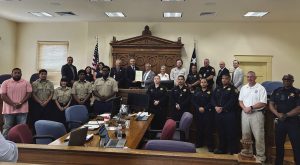By Kim Hilsenbeck
Fitting in the newly created Veterans Court on an already busy docket was a challenge for County Court at Law 3 Judge Linda Rodriguez. But this past spring, she agreed to preside over the Hays County Veterans Court, a specialty court that diverts veterans from the traditional criminal justice system.
With no money allocated to the program, she, her staff and others worked basically for free from May until learning that a grant — nearly $100,000 — came through in October.
Veterans Court is held twice a month on Friday afternoons. Sessions take about 45 minutes.
Why start a Veterans Court?
Rodriguez said the goal was to help veterans charged with misdemeanor offenses try to have criminal cases dismissed from their record by entering the program. She said the veterans must get help with drug and alcohol addiction, seek counseling or deal with anger management; and in some cases, all three.
Research over the past few years indicates that many veterans who end up in court cases suffer from mental illness, traumatic brain injury and/or substance abuse related to military hazardous duty. Rising rates of military veterans entering the criminal justice system are evident across the United States.
Veterans in Hays County now have the option to enter the specialty court program, which is for first-time, qualified misdemeanor offenders only.
Rodriguez said she now has about 12 veterans who opted for that route in hopes of keeping their criminal records clean.
The popularity of Veterans Court is evident across the United States as counties work to help servicemen and women who come home from war deal with the physical and psychological effects of combat. The stressors experienced during war often lead to later involvement in the justice system, usually due to behavior that is related to substance abuse, anxiety, depression and lack of anger control.
Seeing a rising need for help among military veterans who end up in the criminal justice system, Rodriguez said Hays County decided to offer the specialty court. It’s modeled on veterans courts in Travis and other local counties.
Information on the website for the Travis County Veterans Court says such programs are typically designed as a hybrid mental health and drug court, utilizing a non-adversarial approach that has been shown to reduce the risk of recidivism by as much as 35 percent.
Hays County’s program came together through the efforts of Hays County Veteran Services Officer Jude Prather and AMVETS Post 115 Veterans Services Officer Alan Cameron, according to Rodriguez.
But it is a group effort that makes it function in practice.
“We use a team approach,” Rodriguez said. “The team is comprised of the District Attorney’s office, the [county’s] mental health office, veterans justice outreach, Prather’s office, [the] adult probation [office] and my office.”
Rodriguez explained the process in a recent interview.
“When arrested, offenders are asked if they are a veteran as part of the intake form at [the Hays County] jail. If yes, they’re routed (through magistration) to Friday afternoon veterans court dates,” she said.
Most arraignments take place at 1:30 p.m. every other Friday.
“I explain all their options,” Rodriguez said. “They can plead not guilty, or say they don’t want to participate [in Veterans Court]. They can ask for a court appointed attorney.”
All candidates go through a review of their DD14 — the discharge papers from the military.
“They can’t have a dishonorable discharge [to participate in Veterans Court],” Rodriguez said.
If the veteran wants to be evaluated for Post Traumatic Stress Disorder (PTSD), Rodriguez said she will do that.
“Everybody on the team sits around the table,” she said. “We discuss each case and decide if this person does or doesn’t meet the criteria.”
First-time offenders who meet the program’s eligibility requirements will be allowed to participate in a wraparound program that will identify their needs, set them up with resources and monitor their progress for up to two years, Prather said, noting that he expects the program will help reduce recidivism among veterans.
Once accepted into the program, Rodriguez said the team develops a plan of action, or what’s called a strategic action plan, for each individual. Do they need counseling, mental health treatment? Are they reporting to probation?
“Our coordinator gets involved,” she said. “Are there housing issues? Are they going through or are already divorced? Do they have family law issues?”
Rodriguez said the team tries to help determine what all is impacting these veterans. The team then tracks their progress. And she sees each program participant every other Friday for an update.
“Are they going to meetings, seeing their counselor? What’s going on with housing?” are some of the questions she asks the veterans. “Do they have any problems? How are they doing?”
Prather said his vision for Veterans Court was to get to the root cause of why returning servicemen and women get into trouble with the law.
“This type of court will help to treat the reason the problem exists and give the offender an incentive to succeed,” Prather said. “The Veterans Court program is designed to provide services and supervision to veterans with a diagnosed substance abuse and/or mental health issue and improve access to needed treatment and services for jailed veterans.”
With the recent grant in the amount of $99,997, Rodriguez said the county hired two veterans — one as a coordinator, the other as an assistant. They serve as case managers for the program participants.
“Our goal is to recognize which offenders have a bona fide need for treatment and services that they aren’t currently getting and give them an opportunity to go through a strictly supervised program in a military-style civilian setting that can keep them out of jail and get them back on the road to the quality of life they deserve,” Prather said.





